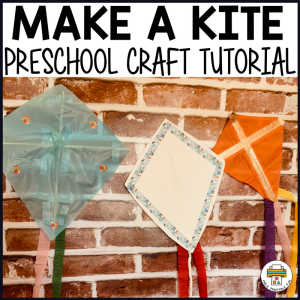Kite flying is a fun and exciting activity for children of all ages.
For preschoolers, kite activities can be both engaging and educational, promoting cognitive, social, emotional, and physical development.
From making and decorating their own kites to exploring the science behind how kites fly, there are many ways to incorporate kites into the preschool curriculum.
We will explore Preschool Kite activities that are age-appropriate, stimulating, and fun.
Kite Making

Let preschoolers make their own kites using materials such as paper, string, and sticks. This activity promotes creativity, problem-solving, and fine motor skills.
Kite Decorating

Provide children with various materials such as paint, markers, stickers, and glitter to decorate their kites. This activity promotes creativity, color recognition, and fine motor skills.
Kite Flying

Take children outside to fly their kites on a windy day. This activity promotes gross motor skills, hand-eye coordination, and socialization.
Related: 25 Outdoor Games for 4 – 5 Year Olds
Kite Shapes

Cut out different shapes from construction paper and have children glue them onto their kites. This activity promotes shape recognition and fine motor skills.
Kite Counting

Have children count the number of tails or ribbons on their kites. This activity promotes counting and number recognition.
Related: 20 Exciting Indoor Games for 6 to 12 Year Olds
Kite Science

Discuss the concept of wind and how it helps the kite to fly. This activity promotes scientific curiosity and understanding.
Kite Races

Have children race their kites to see whose goes the farthest. This activity promotes gross motor skills, hand-eye coordination, and socialization.
Kite Math

Have children measure the length and width of their kites using a ruler. This activity promotes measurement and math skills.
Kite Songs

Sing songs such as “Let’s Go Fly a Kite” by Mary Poppins or “Up, Up, and Away” by The 5th Dimension. This activity promotes language and socialization.
Kite Story Time

Read books such as “Curious George Flies a Kite” by H.A. and Margret Rey or “The Kite Festival” by Leyla Torres. This activity promotes language and literacy skills.
Kite Shapes Scavenger Hunt

Have children search for objects in the classroom or outside that match the shapes on their kites. This activity promotes shape recognition and observational skills.
Kite Weather Journal
Have children record the weather conditions on the days they fly their kites, such as wind speed and direction. This activity promotes scientific observation and language skills.
Kite Storytelling
Have children use their kites as inspiration to create and tell their own stories. This activity promotes creativity, language, and storytelling skills.
Kite Obstacle Course

Set up an obstacle course for children to navigate while flying their kites. This activity promotes gross motor skills, hand-eye coordination, and problem-solving.
Kite Aerodynamics

Experiment with different shapes and materials to see how they affect the way a kite flies. This activity promotes scientific curiosity and problem-solving.
Kite Colors

Have children identify and name the colors on their kites. This activity promotes color recognition and language skills.
Kite History

Discuss the history and cultural significance of kite flying in different parts of the world. This activity promotes cultural awareness and social studies skills.
Kite Collage

Have children cut out pictures of kites from magazines and create a collage. This activity promotes fine motor skills, creativity, and problem-solving.
Kite Cooperative Play

Have children work together to fly a large kite or create a kite train. This activity promotes socialization, cooperation, and teamwork.
Kite Puppet Show
Have children create puppets of their kites and put on a puppet show. This activity promotes creativity, storytelling, and language skills.
Related: 20 Quick Interactive Activities for Preschoolers & Toddlers (Age 3 – 5)
Conclusion
In conclusion, kite activities can be a valuable addition to the preschool curriculum, providing children with an engaging and fun way to learn about various aspects of the world around them.
Whether it’s exploring the science of aerodynamics or fostering teamwork and cooperation while flying kites together, these activities promote learning and development across a range of areas.
By incorporating kite activities into their teaching strategies, preschool educators can help children build important skills and knowledge that will serve them well throughout their lives.

